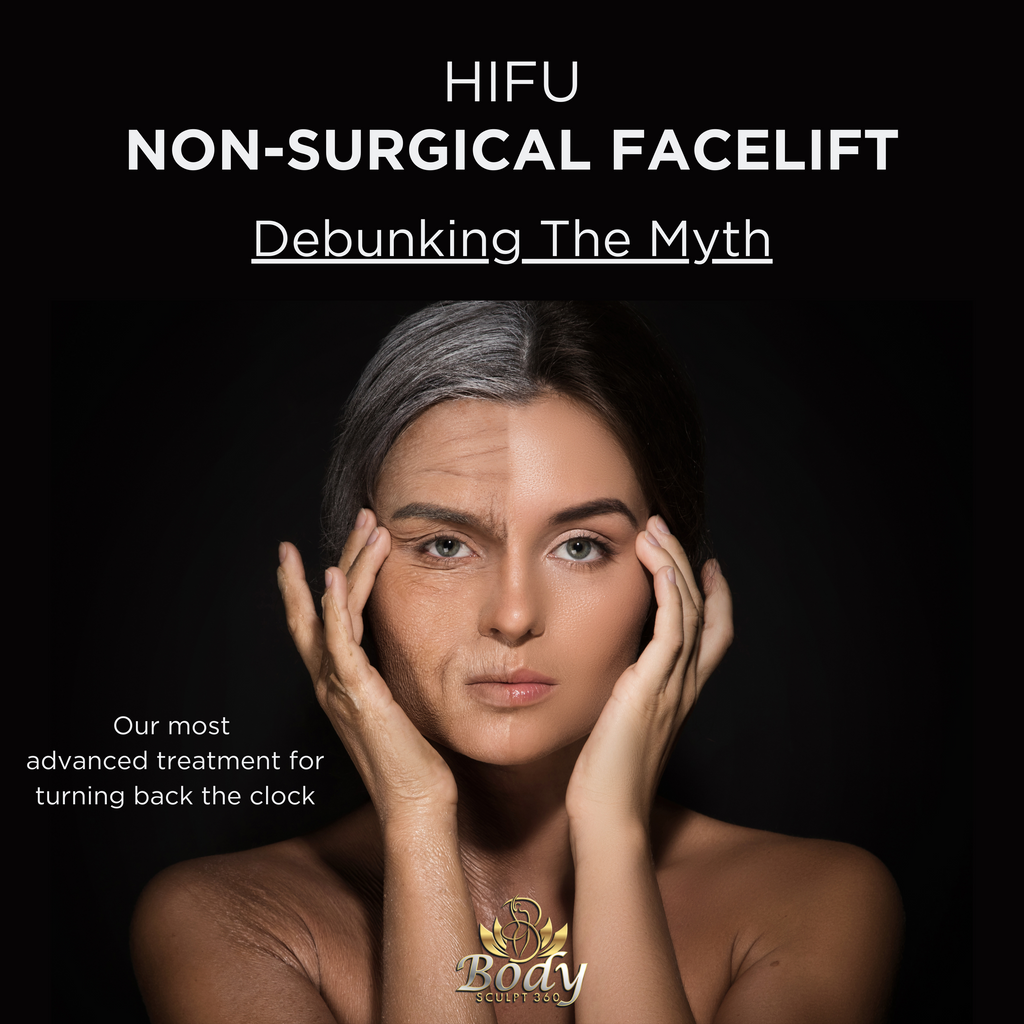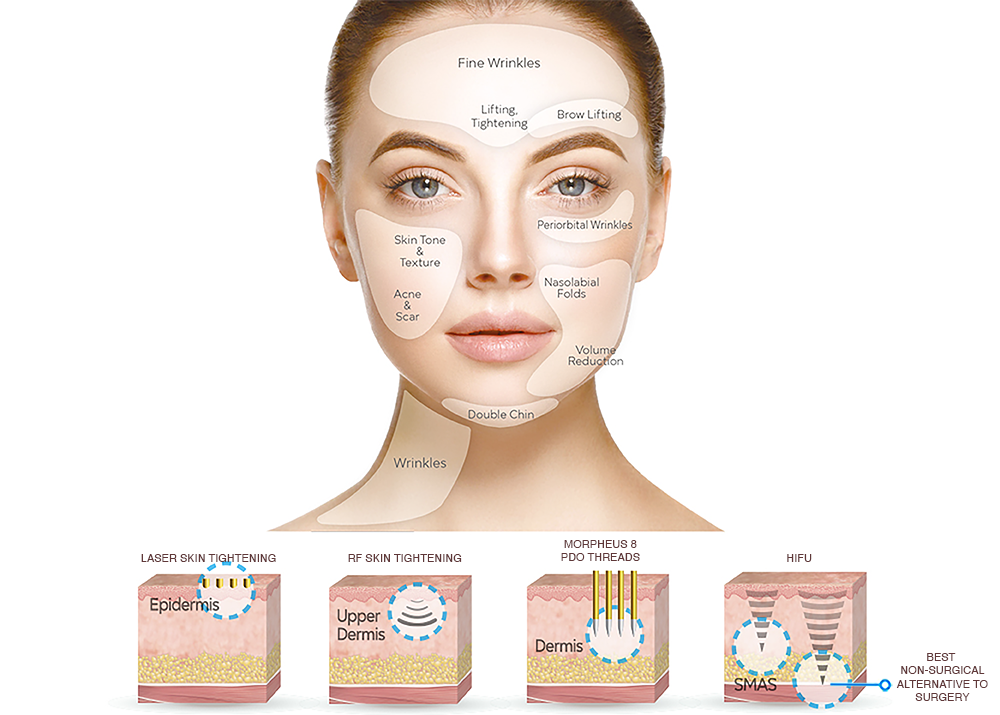Causes of a stroke can vary, but some common factors include:
1. Ischemic stroke: Caused by a blood clot blocking a blood vessel in the brain.
2. Hemorrhagic stroke: Caused by a ruptured blood vessel in the brain, leading to bleeding.
3. High blood pressure: Uncontrolled hypertension can increase the risk of stroke.
4. Atrial fibrillation: An irregular heartbeat can cause blood clots, leading to stroke.
5. Smoking: Tobacco use can damage blood vessels and increase stroke risk.
6. Diabetes: High blood sugar levels can damage blood vessels over time.
7. High cholesterol: Buildup of fatty deposits in blood vessels can lead to stroke.
8. Obesity: Excess weight can contribute to various risk factors for stroke.
9. Sedentary lifestyle: Lack of physical activity can increase the risk of stroke.
10. Family history: Having a family history of stroke can raise the risk.
Regarding non-surgical HIFU (High-Intensity Focused Ultrasound) Facelift treatments, it's important to note that these treatments are primarily focused on rejuvenating the skin and underlying tissues of the face. They use ultrasound energy to stimulate collagen production, resulting in skin tightening and lifting effects.
Non-surgical HIFU Facelift treatments are localized procedures that target the facial area and do not involve surgery or direct manipulation of blood vessels. Therefore, they would not directly cause a stroke. However, it's essential to consult with a medical professional who can evaluate your specific circumstances and provide personalized advice.
The purpose of non-surgical HIFU Facelift treatments is to improve the appearance of the face by lifting and tightening sagging skin, reducing wrinkles, and promoting a more youthful appearance. These treatments are considered non-invasive alternatives to surgical facelift procedures, offering noticeable results with minimal downtime.
Non-surgical HIFU (High-Intensity Focused Ultrasound) Facelift treatments do not directly cause strokes. These treatments are specifically designed to focus ultrasound energy on the targeted facial area, primarily stimulating collagen production and promoting skin tightening and lifting effects.
Unlike surgical procedures, non-surgical HIFU Facelift treatments do not involve incisions, anesthesia, or manipulation of blood vessels. The ultrasound energy used in these treatments penetrates the skin at controlled depths, targeting specific layers of tissue without affecting the surrounding blood vessels or vital organs.
Strokes typically occur due to factors such as blood clots or ruptured blood vessels in the brain. Non-surgical HIFU Facelift treatments do not interfere with the blood flow to the brain or disrupt the cardiovascular system, which are the primary causes of strokes.
However, it's important to note that individuals considering any medical procedure, including non-surgical HIFU Facelift treatments, should consult with a qualified medical professional. They can evaluate the person's medical history, overall health, and individual risk factors to determine the appropriateness and safety of the treatment.
High-Intensity Focused Ultrasound (HIFU) facelifts have gained popularity as a non-invasive cosmetic procedure that promises skin tightening and rejuvenation. However, concerns have been raised regarding potential health problems associated with HIFU treatments. In this article, we will address these concerns and explore the scientific evidence and expert opinions to demonstrate that HIFU facelifts are generally safe and do not cause significant health problems.
Understanding HIFU Facelifts:
HIFU facelifts utilize focused ultrasound energy to heat targeted areas of the skin, stimulating collagen production and resulting in skin tightening effects. The high-frequency ultrasound waves penetrate deep into the skin without causing damage to the surface, making it a popular choice for individuals seeking a non-invasive alternative to traditional facelift surgeries.
Debunking Health Concerns:
1. Scientific Studies: Numerous scientific studies have been conducted to evaluate the safety and efficacy of HIFU facelifts. These studies consistently demonstrate that HIFU treatments have a low risk of adverse events and do not cause significant health problems. The majority of reported side effects are mild and temporary, such as redness, swelling, and slight discomfort.
2. Expert Opinions: Experts in cosmetic medicine and dermatology widely support the safety of HIFU facelifts. These medical professionals have extensively researched and studied the procedure, concluding that it does not pose significant health risks when performed by qualified practitioners. They emphasize the importance of selecting a reputable and experienced provider to ensure optimal results and minimize potential complications.
3. Non-invasive Nature: One of the key advantages of HIFU facelifts is their non-invasive nature, which means that there are no surgical incisions or anesthesia involved. This significantly reduces the risk of complications typically associated with invasive procedures, such as infections, scarring, and the need for extended recovery periods.
4. Targeted Treatment: HIFU technology allows for precise targeting of specific areas, focusing the ultrasound energy only on the intended regions of the face. This targeted approach minimizes the risk of unintentional damage to surrounding tissues and organs, further supporting the safety of the procedure.
5. Regulatory Approval: HIFU devices used for cosmetic purposes undergo rigorous testing and regulatory scrutiny before receiving approval for use. Regulatory bodies, such as the Food and Drug Administration (FDA) in the United States, evaluate the safety and effectiveness of HIFU devices, ensuring they meet stringent standards before being introduced to the market.
Scientific Studies
Below, we provide you with a few examples of studies that have been conducted to evaluate the safety of HIFU facelifts. These studies provide insights into the safety profile of HIFU treatments. Here are a few studies:
1. Study: "Safety and Efficacy of High-Intensity Focused Ultrasound for Facial Rejuvenation: A Split-Face, Randomized Controlled Trial" (2019)
Authors: Guo N, et al.
Published in: Aesthetic Plastic Surgery
Key findings: This study examined the safety and efficacy of HIFU facelifts in a randomized controlled trial. The results demonstrated that HIFU treatments were well-tolerated and showed significant improvement in facial rejuvenation without severe adverse effects.
2. Study: "Safety and Efficacy Evaluation of Ultrasound-Guided High-Intensity Focused Ultrasound Therapy for Noninvasive Facial Rejuvenation" (2016)
Authors: Zhang Q, et al.
Published in: Journal of Cosmetic and Laser Therapy
Key findings: The study investigated the safety and efficacy of ultrasound-guided HIFU therapy for facial rejuvenation. It concluded that HIFU treatments were safe and effective, with minimal side effects and high patient satisfaction.
3. Study: "Safety and Efficacy of High-Intensity Focused Ultrasound in the Treatment of Facial Laxity: A Systematic Review and Meta-analysis" (2020)
Authors: Park J, et al.
Published in: Dermatologic Surgery
Key findings: This systematic review and meta-analysis examined multiple studies to assess the safety and efficacy of HIFU for facial laxity. The analysis concluded that HIFU treatments were safe and effective, with no major adverse events reported.
These studies, along with others conducted in the field, contribute to the growing body of evidence supporting the safety of HIFU facelifts. Consulting peer-reviewed scientific literature and discussing any concerns with a qualified healthcare professional will provide you with the most up-to-date and comprehensive information on the topic.
Conclusion:
Based on scientific evidence, expert opinions, and regulatory approvals, it is evident that HIFU facelifts do not cause significant health problems. The non-invasive nature of the procedure, along with its targeted treatment approach, contributes to its overall safety profile. However, it is important to note that individual experiences may vary, and like any cosmetic procedure, HIFU facelifts may carry minimal risks and potential side effects. Therefore, it is crucial to consult with a qualified healthcare professional before undergoing any cosmetic treatment to ensure suitability and personalized care. If you have serious health conditions or are under the care of a physician for any reason, it is important to consult with your doctor or other qualifying medical professional.
As with any medical or non-surgical aesthetic procedure, it is essential to rely on credible information and seek guidance from trusted professionals to make informed decisions about HIFU facelifts or any other cosmetic treatments.











